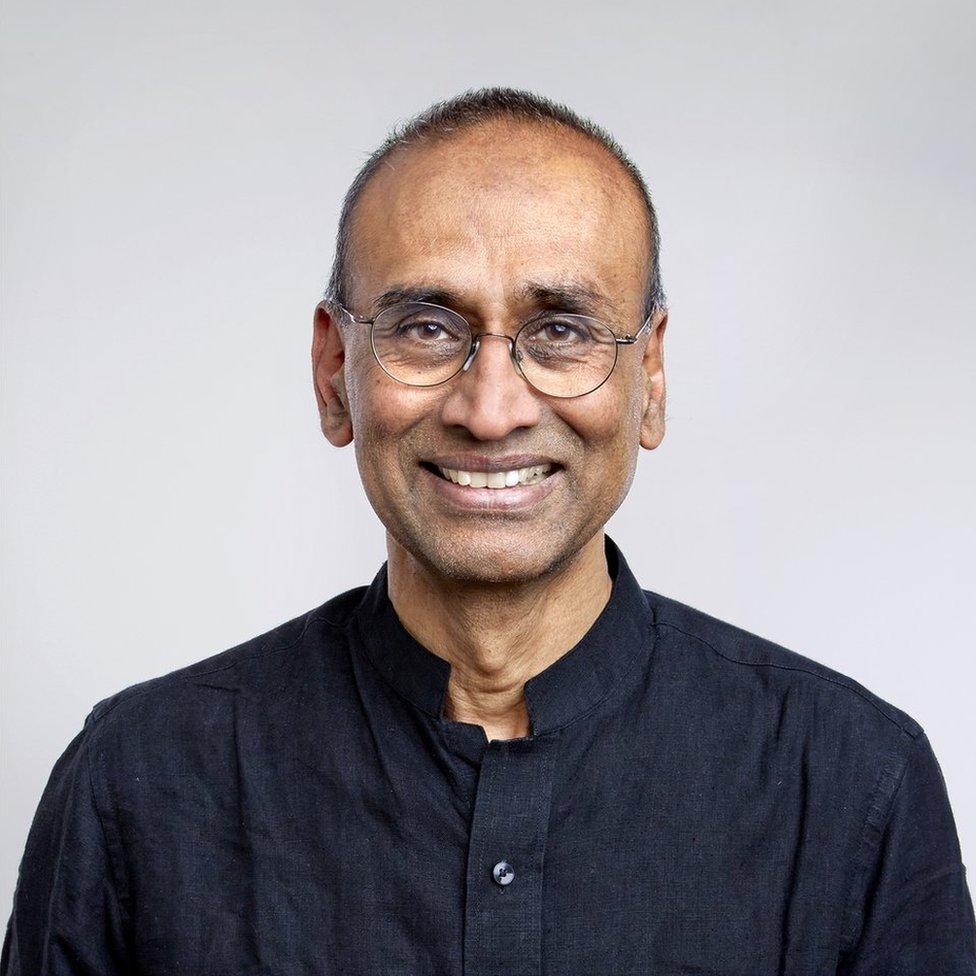Overhaul England's 'narrow' A-levels, says top scientist
- Published

A-levels are too narrow and are not teaching pupils the skills they need for the future, says Prof Sir Venki Ramakrishnan
England's A-levels are among the narrowest upper secondary systems in the world and need radical change, the president of the Royal Society will say in a speech on Tuesday.
Nobel prize winner Prof Sir Venki Ramakrishnan wants an independent review of post-16 education, and exams transformed within 10 years.
His call comes after a leading MP urged an overhaul of both GCSEs and A-levels.
The government says recent reforms have made A-levels more fit for purpose.
However, Cambridge biologist Sir Venki, who took over as Royal Society president in 2015, believes these changes are just "tinkering".
Under the new system, students now sit all A-level exams at the end of two years of study, instead of taking modular exams throughout the course.
AS-level results no longer count towards A-level grades, no subject will have more than a 20% coursework component and most courses will be assessed entirely through exams.
Resits are still available, but January exams have been scrapped, so students will have to wait until May or June of the following year for a chance to improve their grades.
Sir Venki notes concerns that these changes have contributed to further narrowing of the A-level curriculum, with many schools dropping AS-levels and opportunities for wider study in coursework being lost.
He says momentum is building for real change, to create "the sort of system that best prepares young people for the good jobs of the future".
"If we want our young people to be able to get good jobs, and employers to be able to hire the people they need in the future, we need to make sure our schools and colleges are teaching the skills that will be needed.
"A-levels are not doing that," he is expected to tell a one-day conference of scientists, teachers, policymakers and business leaders at the Royal Society Business Forum.
"We are facing a new wave of change driven by technologies such as artificial intelligence.
"Some jobs will change, some will be lost altogether and there will be many new jobs in industries that don't even exist yet.
"To prepare people for this future, we need a much more flexible education system."
A 1951 exam?
Sir Venki is expected to point out that A-levels have been around since 1951, maintaining their focus on a small number of subjects, but much has changed since.
"The Queen was still a princess, less than one in 10 households in the UK had a TV, and those who did could only watch one channel... I doubt [Facebook founder] Mark Zuckerberg's parents were even born."
As the 21st Century progresses, teenagers will need to leave school with a broader range of skills and the narrow scope of A-levels "is not giving them the best start", he will argue.
As a scientist, he says he wants to see everyone studying science and maths to 18, but this should be "alongside subjects like English, history, geography, modern languages and the arts... nor must we forget technical skills".

Everyone should learn science and maths to 18, but alongside humanities, arts and technology, says Sir Venki
Calling for a review into post-16 learning in the next Parliament, Sir Venki wants a consensus of parents, education experts, employers and government to deliver a new curriculum within 10 years.
CBI director general Carolyn Fairbairn is due to tell the conference that a lack of higher level skills is already holding back some firms.
"We must get this right, as one of the final stepping stones into the world of work," she will say.
The National Education Union has welcomed Sir Venki's comments, as well as those of Education Select Committee chairman Robert Halfon, who wants ministers to do away with GCSEs altogether and replace A-levels with a mix of academic and vocational subjects.
Kevin Courtney, the union's joint general secretary, said: "Heading towards qualifications which enable flexibility between vocational and academic pathways at the end of full-time education is a sensible and welcome suggestion, more suitable for modern times.
"Such a change would need to be planned for and introduced with the full involvement of the profession."
In a statement, the Department for Education said: "Our world-class A-levels were designed with direct input from subject experts and universities to ensure young people leave school with the knowledge and skills they need to go on to higher education or get a job."
The statement also said the government was "transforming technical education so there are a Donerange of high quality choices on offer", including apprenticeships and, from next year, T-levels, the technical equivalent of A-levels.
- Published11 February 2019
